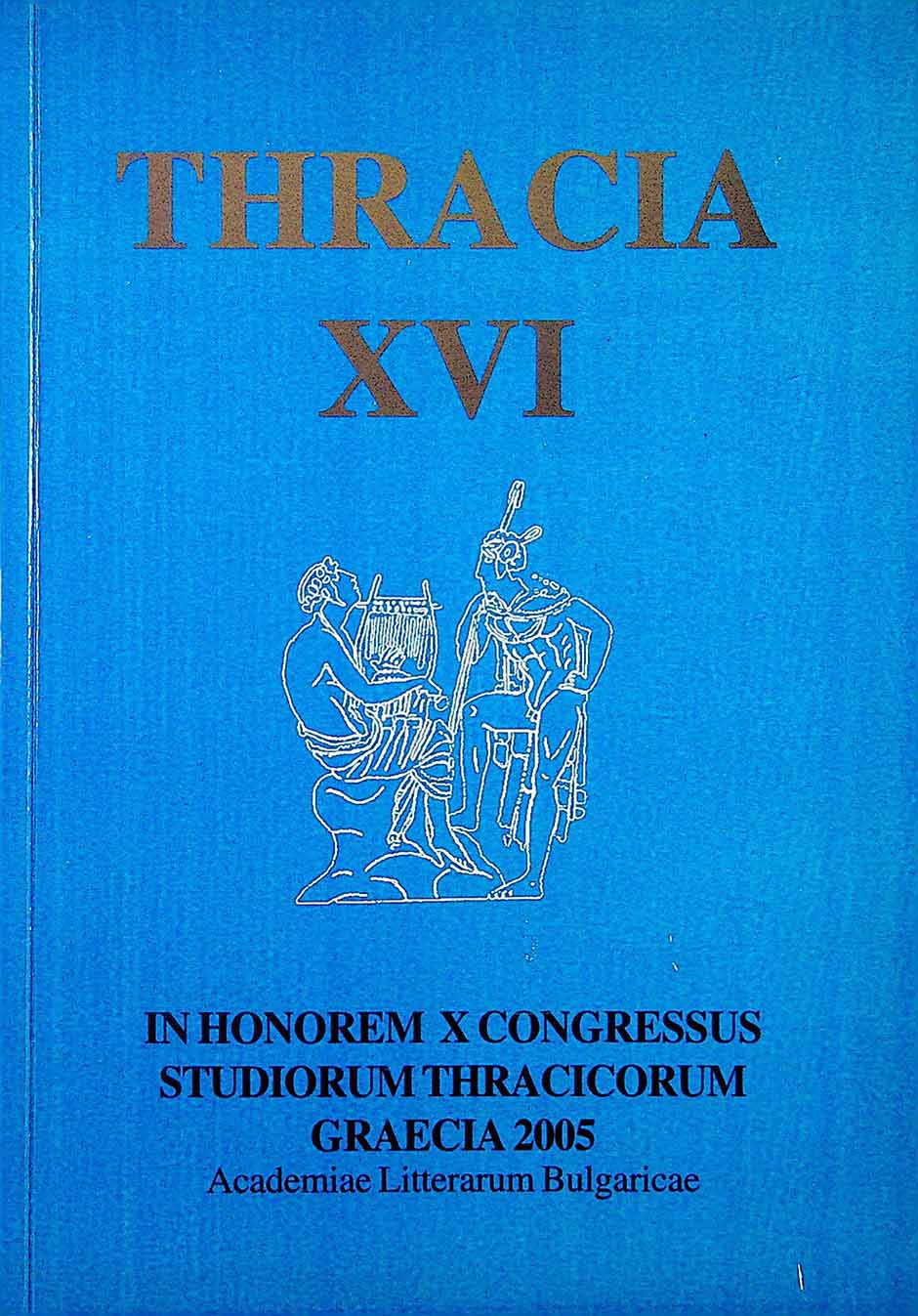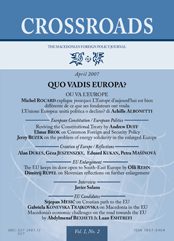

Keywords: media; Albanian; Ali Ahmeti; Macedonia; Democratic Union for Integration; US Embassy in Skopje; Ohrid Framework Agreement; New York Times; NLA; terrorists; Trajkovski; Javier Solana; Balkans; war;2001
This article provides food for thought on the consequences of the West's backing of the Albanian NLA paramilitary force for Macedonia's long-term stability and political processes, with reference to statistical data from Western media coverage of the 2001 conflict.
More...
Keywords: European Union; European Commission; EU membership; civil war; Vlado Buckovski; Ilinka Mitreva; Albanian Democratic Union of Integration; Ali Ahmeti; OSCE
Macedonia is likely to officially become an EU candidate in December. But is the country ready for the demands of membership?
More...
Keywords: Ljube Boskovski; Yugoslavia; ICTY; Johan Tarculovski; Boris Trajkovski; Mane Jakovlevski; VMRO-DPMNE; Goran Mitevski; Aleksandar Cvetkov; Carla Del Ponte
A spectacular acquittal may have implications for ongoing war-crimes prosecutions in Macedonia and The Hague.
More...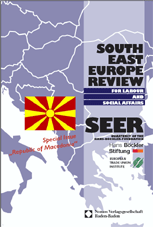

Keywords: Macedonia; culture; statue of Alexander; Prime Minister Nikola Gruevski; NATO; Greece; Ottomans;
With plans to put a giant statue of Alexander in its main square, Skopje picks an expensive fight.
More...The Macedonian route to political democracy and the market economy has been developed under the strong impact of external shocks. The dramatic dissolution of former Yugoslavia, the wars in its neighbourhoods, UN sanctions against Yugoslavia and the unilateral Greek trade embargo have all had a major influence on the Macedonian economy, internal political stability and security. The Kosovo crisis and the NATO military intervention which took place in spring 1999 was the most recent trauma of this kind. The unresolved Kosovo issue has generated many problems within the region. The incapability of Milošević to solve the “problem” of the Albanian minority in the Yugoslav state, and the failure of the western countries to mediate in resolving the conflict, led to the NATO intervention against Yugoslavia. The epilogue has been the withdrawal of the Yugoslav army from Kosovo while NATO has established a kind of protectorate in the area. In this article, we will analyse the impact and the consequences of the Kosovo crisis on Macedonia, focusing our attention mainly on the economic and political (more precisely the inter-ethnic) aspects of the problem. We use this approach since the economic crisis and inter-ethnic relations are the two key questions in the development (we can say even the survival) of the Macedonian state and because both were closely connected to the Kosovo crisis and the NATO intervention.
More...Keywords: 2001 War in Macedonia; Economic Decline; ethnic tensions; Tetovo; NLA
A detailed recap of the effect the 2001 war had on the Macedonian economy, with some key statistics.
More...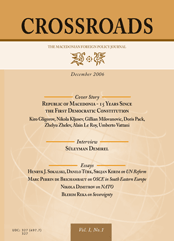


Keywords: European Union; elections; integration; Vlado Buckovski; Social Democratic Union; VMRO-DPMNE; Nikola Gruevski; EU membership
Polling day was uneventful, but overall Macedonia's elections were simply not good enough.
More...On February 26, Macedonia had officially planned to submit an application for EU membership. This decision was discussed in depth and at length in the country and was long overdue as the project enjoyed broad consensus and stood the chance of uniting all citizens, regardless of their ethnic or political background. However, this step was delayed until March because of the tragic death of President Boris Trajkovski, who had signed the application only days before, in a helicopter crash in late February. Macedonia is one of the weakest countries in south-east Europe despite, on the other hand, having signed the first Stabilisation and Association Agreement with the EU in April 2001 and having held since June 2003 the promise of a ‘European perspective’ as a full EU member, so it is worthwhile to look more deeply into the internal problems of the country and into the support of the international community and the Stability Pact in overcoming them.
More...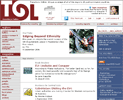
Keywords: civil war; Macedonian government; Macedonian politics; Ohrid; NATO peacekeepers; EU membership; VMRO-DPMNE; Democratic Party of Albanians
Five years on, despite the overall success of the Ohrid agreement, peace in Macedonia is less than robust.
More...Keywords: Macedonia; Ohrid; Albanian; DUI; Macedonians; Radmila Sekerinska; Struga; SDSM; Kostov; Crvenkovski; Tetovo; Chris Patten
Macedonia's biggest challenge of 2004- decentralization of power from Skopje to the local municipalities- seemed no closer to resolution in June than before. Excessive demands from the Albanian DUI coalition members seeking official bilingual rights for not only Skopje but Kicevo and Struga brought negotiations with the leading SDSM party to an impasse. The article discusses how the unresolved tensions are accelerating splintering within parties on both sides of the ethnic divide, even as the deadline for compromise looms in the run-up to nationwide local elections this fall.
More...Keywords: Democracy; Macedonia; political experiment; affirmative action; Arben Xhaferi; Lani Guinier; Arend Lijphart; Justin Raimondo
This article zeroes in on the phenomenon of selective democracy in Macedonia- that is, the implementation of far-leftist dogmas on the "tyranny of the majority," which have been used by Albanian politicians in support of their demands on the Macedonian state. While such theories often originate from well-intended thinkers, it's not likely that they can be implemented - unless, of course, you're arguing with an unaccountable paramilitary group for backup.
More...
Keywords: Macedonia; ethnic Albanian; parliament; Academy of Arts and Sciences; Kosovo; Albania; National Liberation Army; DUI; Muslim; Serbia; Prime Minister Sali Berisha; encyclopedia; Southeast European University;
A first attempt to chronicle the history of independent Macedonia sows rancor inside and outside the country.
More...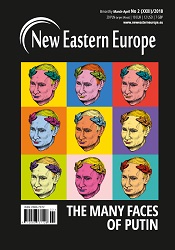
Keywords: Macedonia;EU Integration of Macedonia;Macedonia name
Interview with Zoran Zaev, the prime minister of the Republic of Macedonia.
More...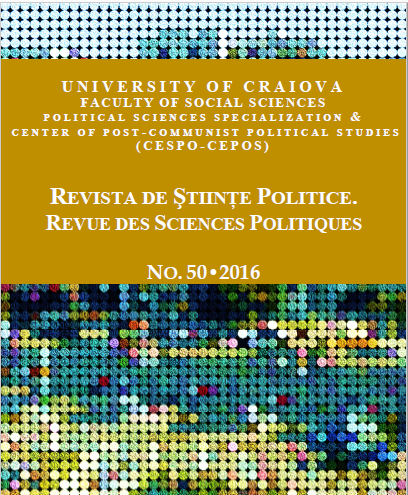
Keywords: Macedonia; religion; challenges; relations; conflict;
In places where social multiethnicity and multiculturalism is detected, the interethnic and interreligious dialogue is considered to be the imperative of time which should be initiated by the government itself. But in recent years, the Republic of Macedonia as a multiethnic and multireligious state goes in the direction of ruin the interethnic and interreligious harmony, thereby destroying the basic rules of the secular state. The purpose of this scientific study is to make a specialized overview regarding the recent function of secularism in the Republic of Macedonia. The main hypothesis of this study is the confirmation that in the Republic of Macedonia there is an attempt to ruin secularism by the actual government. This will be proven by mentioning several cases and challenges that occurred in our country lately as well as we will recommend way of overcoming the same. Different methods were used in this study, starting with the descriptive method by consultingrelevant bibliography and analyzing relevant reports from the country and the international factor, the causal method, the content analysis, whereas a questionnaire was used as a technique which was filled by people living in the main cities of the Republic of Macedonia between January and March 2015, and an interview was held as well. The results of this study prove that in recent years the borders of secularism were infringed and that the political parties through the impact of government indirectly helped one particular religious community, so that there is ethnical and religious conflict and discrimination which has had a great impact not only on the country but this is reflected in the region as well, in the development of reports with the neighboring countries of the Republic of Macedonia.
More...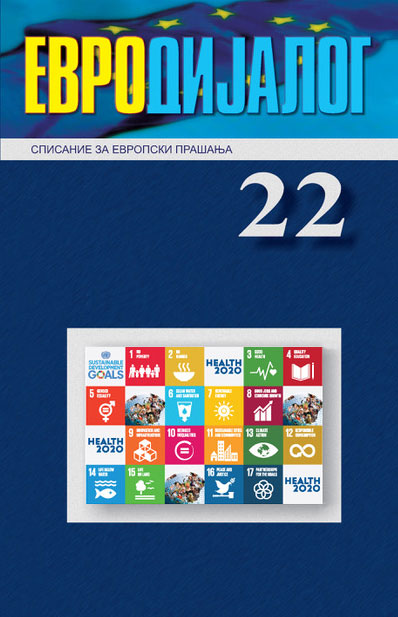
Keywords: /
In many countries, the older population represents a considerable portion of the total population. Economic, social, health, educational, cultural and other implications caused by the process of demographic ageing impose the need to undertake serious steps in adjusting society to the novel demographic reality. Public health should continuously monitor developments and find means to improve the health of the elderly, and provide them adequate support and health care in order to help them function independently for as long as possible. Crisis present in the health and social protection systems may result in worsening of the quality of life, but through good planning, and the elderly health promotion concept for healthy ageing, they may become a beneficial social potential, a dynamic and motivated part of society, instead of a burden to the family and community. Elderly programmes have long been part of the Macedonian legislation, duly adapted to the health needs and harmonised with the global and European strategies for sustainable development, the health strategies, the strategies for social inclusion, intergenerational solidarity, active ageing and ageing with dignity. Future policies are focused on providing a wide range of information and activities for self-protection and support, aimed at preventing early disability due to chronic disease or weakening of the general functions in the elderly.
More...